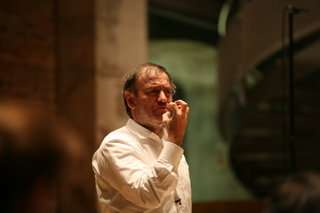|
Back
Three More Stravinsky Faces New York
Avery Fisher Hall, Lincoln Center
04/28/2010 - & April 29, 2010
Igor Stravinsky: Zvezdolikiy (Le Roi des Etoiles or Star-Face – Violin Concerto in D – Œdipus Rex
Leonidas Kavakos (Violin), Waltraud Meier (Mezzo-Soprano), Anthony Dean Griffey, Alexander Timchenko (Tenors), Ilya Bannik, Mikhail Petrenko (Basses), Jeremy Irons (Narrator)
Chorus of the Mariinsky Theatre, Andrei Petrenko (Principal Chorus Master), New York Philharmonic Orchestra, Valery Gergiev (Conductor)

V. Gergiev (© Matt Stuart/Courtesy of LSO)
Nobody would be surprised if the Avery Fisher Hall concert stage was to collapse one of these nights. In bringing forth–like Venus from the Waves–more than a dozen Stravinsky works these weeks, Valery Gergiev has not gone easy on the forces at his command. Of course the Mariinsky Choir, the complete New York Philharmonic (which seemed to be expanded), soloists a-plenty, percussion to the rooftops, four pianos…
The audience itself has been pretty well filled as well. Probably half last night came to hear Jeremy Irons as the narrator in Œdipus, some came for the Violin Concerto. A rare few were anxious to hear the one piece of Stravinsky almost never played, Star-Face (not to be confused with Brian de Palma’s Scarface. Why did it have to wait three decades before its first performance? Why did its dedicatee, Claude Debussy, say that this “music for the planet…would be lost in the abyss if performed on earth?”
More important, why was this the first performance I can ever remember in New York?
Part is practicality. It’s only 53 measures, lasts less than seven minutes, and needs an explosively good orchestra and chorus. Partly because the words by Konstantin Balmont are, at least in English, mystical, garish, resembling a Byzantine painting from the End of the World.
Still, this was fascinating music erupting from the composer, just prior to Rite of Spring. The latter was pagan and primitive. Star-Face engenders the heavy incense and dark candles of Ivan IV’s Russian Orthodox Church. If the choral sounds are both dissonant and religious at the same time, they also resemble those rare Russian Orthodox chants prior to the 18th Century, before Russia “discovered” Europe. Those incantations too were characterized by medieval scales, by tones next to each other, edging each other out. No orchestra was used, of course, but Stravinsky’s huge orchestra here was singular, actually echoing a huge organ. Not the blurred orchestral organ of a Saint-Saëns or a Bruckner, but a cathedral organ with all the stops pulled out.
The Mariinsky chorus again proved that they have a volume and precision under Gergiev which is rare even in New York choruses, while the New York Phil themselves pulled out all the stops.
What the following “classical period” Violin Concerto lacks in musical audacity, it possesses in jollity. The opening is less toccata than circus music, the ending is pure Russian, and the middle is not very memorable, still-born slow movement.
The Greek violinist, Leonidas Kavakos, bears the name of the great Spartan king, and Mr. Kavakos himself played with laconic pleasure. One could say the reading was effortless, taking the difficult treble-stringing as easily as the jumpy end. I doubt if many soloists can give the Stravinsky much gravitas, but he tried.
Gravitas, though, was the word for Œdipus Rex. It is one of the most powerful, dramatic, emotional operas (yes, an opera!!) ever written by Stravinsky. Given a choice of Rake’s Progress or Œdipus, anybody in their right mind would prefer this gorgeous hodgepodge more than W.H. Auden’s all too perfect Rake.
Linguistically, it’s a hodgepodge. The libretto is a Latin translation of a French drama taken from an English translation of the original Greek. The narration is in English (much against Stravinsky’s original desires), and this English translation of Jean Cocteau’s French was written by none other than the poet E.E. Cummings.
As an opera, Œdipus probably has its shortcomings, since most of the characters are static. But my heavens!! Under Gergiev’s direction, with a sharp dramatic reading by Jeremy Irons, this was a work with greater dramatic sharpness than Stravinsky could ever imagine.
We listened, horrified, as Anthony Dean Griffey sung out, with an Irish tenor resonance, his oath to find the man causing the plague. In Jocasta’s aria, Stravinsky produced an aria which could have come from Trovatore, including the choral harmonies. The ending, with Mr. Irons gritting his teeth as the murderer is found, was almost shocking.
The other works last night (and tonight) are questionable, problematic. But Œdipus, like the opening night’s Noces, is amongst the most powerful stage works of the 20th Century, And Valery Gergiev gave it all the intensity it deserved.
Harry Rolnick
|